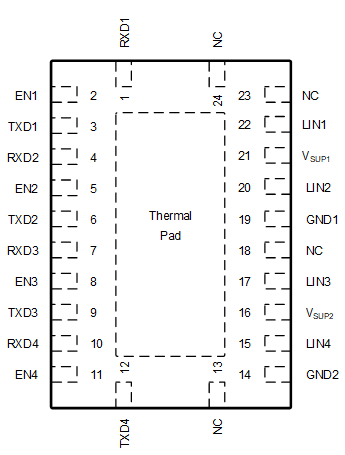SLLSFF6 September 2021 TLIN1024A-Q1
PRODUCTION DATA
- 1 Features
- 2 Applications
- 3 Description
- 4 Revision History
- 5 Description (Continued)
- 6 Pin Configuration and Functions
- 7 Specifications
- 8 Parameter Measurement Information
-
9 Detailed Description
- 9.1 Overview
- 9.2 Functional Block Diagram
- 9.3
Feature Description
- 9.3.1 LIN (Local Interconnect Network) Bus
- 9.3.2 TXD (Transmit Input and Output)
- 9.3.3 RXD (Receive Output)
- 9.3.4 VSUP1/2 (Supply Voltage)
- 9.3.5 GND1/2 (Ground)
- 9.3.6 EN (Enable Input)
- 9.3.7 Protection Features
- 9.3.8 TXD Dominant Time Out (DTO)
- 9.3.9 Bus Stuck Dominant System Fault: False Wake-Up Lockout
- 9.3.10 Thermal Shutdown
- 9.3.11 Under Voltage on VSUP
- 9.3.12 Unpowered Device and LIN Bus
- 9.4 Device Functional Modes
- 10Application and Implementation
- 11Power Supply Recommendations
- 12Layout
- 13Device and Documentation Support
- 14Mechanical, Packaging, and Orderable Information
Package Options
Mechanical Data (Package|Pins)
- RGY|24
Thermal pad, mechanical data (Package|Pins)
- RGY|24
Orderable Information
6 Pin Configuration and Functions
 Figure 6-1 RGY
Package,24-Pin RGY (VQFN),Top View
Figure 6-1 RGY
Package,24-Pin RGY (VQFN),Top ViewTable 6-1 Pin Functions
| PIN | I/O | DESCRIPTION | |
|---|---|---|---|
| NAME | NO. | ||
| RXD1 | 1 | O | Channel 1 RXD Output (open-drain) interface reporting state of LIN1 bus voltage |
| EN1 | 2 | I | Channel 1 Enable Input |
| TXD1 | 3 | I | Channel 1 TXD input interface to control state of LIN1 output |
| RXD2 | 4 | O | Channel 2 RXD Output (open-drain) interface reporting state of LIN2 bus voltage |
| EN2 | 5 | I | Channel 2 Enable Input |
| TXD2 | 6 | I | Channel 2 TXD input interface to control state of LIN2 output |
| RXD3 | 7 | O | Channel 3 RXD Output (open-drain) interface reporting state of LIN3 bus voltage |
| EN3 | 8 | I | Channel 3 Enable Input |
| TXD3 | 9 | I | Channel 3 TXD input interface to control state of LIN3 output |
| RXD4 | 10 | O | Channel 4 RXD Output (open-drain) interface reporting state of LIN4 bus voltage |
| EN4 | 11 | I | Channel 4 Enable Input |
| TXD4 | 12 | I | Channel 4 TXD input interface to control state of LIN4 output |
| GND2 | 14 | GND | Ground pin for Channels 3 and 4 |
| LIN4 | 15 | I/O | Channel 4 LIN Bus single-wire transmitter and receiver |
| VSUP2 | 16 | Supply | Channels 3 and 4 Supply Voltage (connected to battery in series with external reverse blocking diode) |
| LIN3 | 17 | I/O | Channel 3 LIN Bus single-wire transmitter and receiver |
| GND1 | 19 | GND | Ground pin for Channels 1 and 2 |
| LIN2 | 20 | I/O | Channel 2 LIN Bus single-wire transmitter and receiver |
| VSUP1 | 21 | Supply | Channels 1 and 2 Supply Voltage (connected to battery in series with external reverse blocking diode) |
| LIN1 | 22 | I/O | Channel 1 LIN Bus single-wire transmitter and receiver |
| NC | 13, 18, 23, 24 | – | Not Connected |
| Thermal Pad | – | Can be connected to the PCB ground plane to improve thermal coupling | |